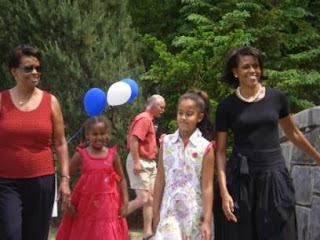I know I'm about two weeks behind on talking about the now infamous
New Yorker cover of the Obamas--the one that was meant to be satirical.

[This is the cover in question]
There have been A LOT of talking heads, bloggers, and journalists who have weighed in on this issue already--
The Huffington Post (this is actually a Q&A with
New Yorker editor, David Remnick, but it contains a link to
Rachel Sklar's own take (and several comments) about the cover,
Racialicious (who talks about its link to hipster racism and the long comment threads are, as always, very interesting reading), and
The New York Times, which gives an account of political satire in the general public sphere related to the upcoming presidential elections.
And really, after all these people have said so much, what exactly do I have to add to all this?
Simply this: racial satire is difficult and is best avoided by any but the most practiced and skilled of humorists.
According to the on-line Merriam-Webster dictionary, satire is defined as:
1 : a literary work holding up human vices and follies to ridicule or scorn
2 : trenchant wit, irony, or sarcasm used to expose and discredit vice or folly
One of the most famous satirists, Jonathan Swift, was reviled after he wrote
"A Modest Proposal" in which many readers did not understand that he was not seriously proposing cannibalism as a remedy to poverty in Ireland. The essay is now a model for exactly what the definition of satire suggests--it uses irony and trenchant wit to expose the ridiculousness and vice of the impoverished situation of many in Ireland living under British colonial rule.
Now racial satire is a more distinct entity than satire--it's not simply political satire as
The New York Times article wants to suggest; racial satire hinges on a distinct understanding on the parts of the person creating the satire and her/his audience. It requires, in other words, an understanding of racism and in the U.S. what those conditions have been like for various groups--what those stereotypes are--so that the send-up, the sarcasm, the satire will be successful.
And racial satire seems best practiced when the person who is doing the satire is sending up the racial group that s/he identifies with. Hence
Margaret Cho's routine when she talks about being Korean and Asian American can be seen as satirical because she is mocking both mainstream culture (largely white) as well as her fellow Korean and Asian Americans. And it's easier for us to take her racial satire because she is speaking from an in-group position.
Similarly, in
"The Racial Draft" skit, Dave Chappelle introduces his skit by talking about his Asian American wife and the difficulties of multiracial identification. His personal admission lets us know that he is speaking from a place of experience--and if he has children, they will be part of the "confusion" that he is trying to satirize.
Yet even with Cho and Chappelle, there can be moments of discomfort--times when I laugh and I wonder what, exactly, am I laughing at...and moments of discomfort wondering if the other people around me (I've been to several of Cho's live shows) really "get" the joke.
Racial satire, and really,
racial humor in general, are so tricky that a comedian as skilled as Dave Chappelle has cancelled his show, in part, because he was disturbed by some white people not getting the satire--not understanding that what he was trying to do was to expose the absurdity of race and racism in a humorous vein and not simply to mock African Americans and others.
[BTW, this is what I've largely heard reported about Chappelle--but does anyone have a link to an interview he has done that specifically talks about the reasons he ended his show?]
The New Yorker cover failed, in my opinion, largely because a magazine like
The New Yorker isn't skilled in handling racial satire and not only didn't show an appropriate sensitivity but also failed to make that satire clear--as one commenter noted in the Racialicious thread, if this image had appeared in the heads of an anxious, white conservative voter, or even an "average white American" and then another thought bubble appeared with an "average African American" or even the Obamas' themselves picturing the scene very differently, THEN, maybe, we could see the satire better.
But even had they done this,
The New Yorker is indelibly marked as an elitist magazine, one associated with the New York upper-East side intelligensia, largely marked as white (albeit liberal). If this same image had appeared on the cover of
Ebony or
Jet or
Hyphen or
Colorlines, I think there would have been a different reaction--some people may have still talked about the inappropriateness of the cover, but the context would have changed a lot--the readership of these magazines would be assumed to have more access to the stereotypes and to understanding the racism inherent in what was trying to be satirized. And the staffs and editorial boards (and editors-in-chief) of these magazines would be assumed to be either people or color or white allies who understand the fraught dynamics of race and racism and the trickiness of racial satire.
Because at the end of the day, some things aren't funny. And while I know
The New Yorker was trying to talk about the politics of fear and anxiety that lead some people to view the Obamas through the lens of the cover, the unfortunate reality is that like in Swift's 18th C. Ireland, many people didn't get the joke and just assumed that the cover was a reflection of reality rather than a mirror held up to the racist fantasies of some people.



